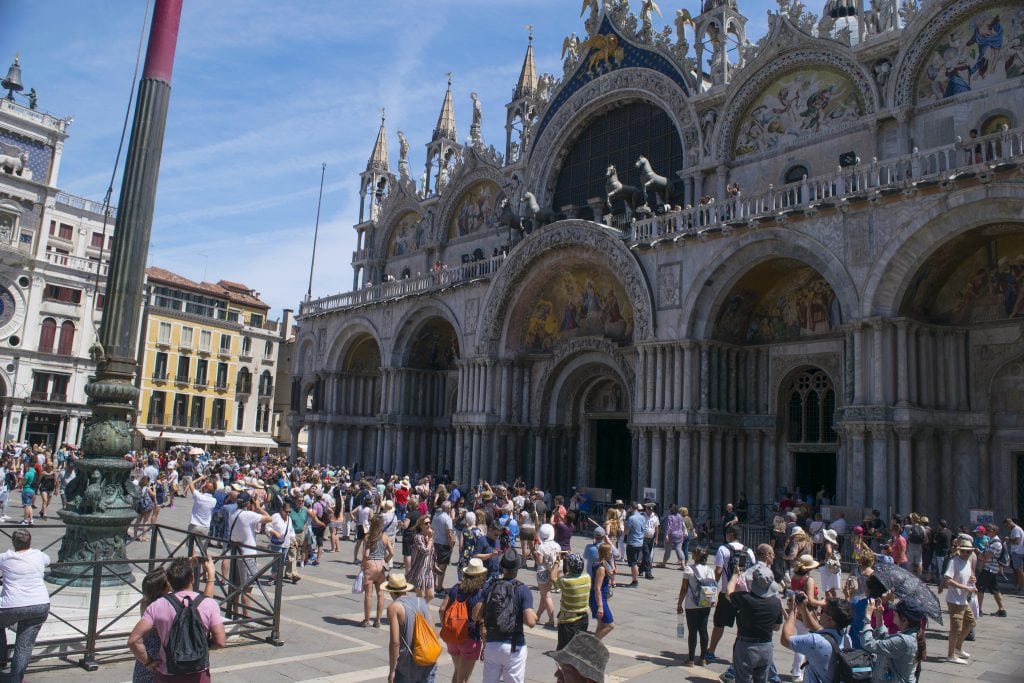Skift Take
Finding ways to insulate destinations from the adverse effects of overtourism is a daunting challenge. Global groups are starting to do the hard work of devising methods to better manage destinations.
 Hundreds of the travel industry’s most-forward-thinking executives will gather for our third annual Skift Forum Europe in London on April 30. In just a few years, Skift's Forums — the largest creative business gatherings in the global travel industry — have become what media, speakers, and attendees have called the “TED Talks of travel.”
Hundreds of the travel industry’s most-forward-thinking executives will gather for our third annual Skift Forum Europe in London on April 30. In just a few years, Skift's Forums — the largest creative business gatherings in the global travel industry — have become what media, speakers, and attendees have called the “TED Talks of travel.”
Focusing on responsible travel practices and other key issues, Skift Forum Europe 2019 will take place at Tobacco Dock in London. The Forum will feature speakers, including CEOs and top executives from British Airways, IHG, Thomas Cook, Booking.com, TripAdvisor, Silversea, Uber, and many more.
The following is part of a series of posts highlighting some of the speakers and touching on issues of concern in Europe and beyond.
As destinations around the world grapple with the ramifications of overtourism, many across the travel industry have realized the need for better strategic management as global tourism grows in the next decade.
Salli Felton, CEO of the UK’s The Travel Foundation, thinks that the hidden costs of tourism growth are strangling attempts to balance the health of global destinations. There is an urgent need for improved tools and processes to understand the effects of tourism and devise ways to limit its destructive outcomes.
At the upcoming Skift Forum Europe at London’s Tobacco Dock on April 30, Felton will discuss new methods for better quantifying the effects of increased tourism. She’ll also explore the changes that need to take place for destination management to become more sophisticated in its approach for the future.
Skift: What are the most problematic issues you expect to arise with global tourism set to grow?
Salli Felton: We know that tourism can provide significant economic benefit to destinations through contributions to GDP, attracting investment in infrastructure, and through the provision of a variety of taxes. But tourism also comes with numerous local costs — financial, environmental, and social. We just don’t measure these costs.
This makes it impossible for destinations to understand the balance between the benefits of tourism and the costs until a tipping point is reached and the costs overflow. The result is the degradation of natural and cultural capital, the deterioration of public infrastructure, and resident dissatisfaction or displacement.
Skift: How do you look at the hidden costs of tourism to destinations and the environment?
Felton: Tourism managers can no longer focus on a narrow set of economic measures to assess the health of their destination — this will only result in failing to account for the invisible burden of tourism. The answer lies in more holistic accounting systems that provide an accurate understanding of where the costs of tourism are occurring and who is paying for them.
This would enable tourism managers to measure the capacity of public assets such as water, energy, and waste infrastructure required for both resident and tourist populations. By doing this, they could assess capacity needs in the short term and highlight any longer-term investment required to increase capacity to match forecast growth.
It would also provide them with an understanding of the value of natural and cultural assets such as beaches, protected areas, and monuments, and the costs to maintain these assets to ensure their long-term integrity for both residents and tourists.
Skift: Thinking about the future of sustainable travel, what can be done to better prepare destinations to cope?
Felton: It’s easy to say the answer is destination management. Of course, it is, but “destination management” has been happening since tourism began, and it hasn’t stopped tourism’s invisible burden from growing. It seems clear that the current style of destination management isn’t working, and we simply can’t continue to pretend that destination marketing is, in fact, destination management.
Destination managers need support to develop new skills and new ways of working that will enable them to move beyond tourism marketing. They need the skills to review and analyze the risks to their destination assets and the tools to [form a] master plan [for] tourism in a way that adequately considers the capacity of supply versus demand from both resident and tourist populations.
Skift: Are tourists suitably educated on the environmental effect of their trips? What can be done to educate them?
Felton: When you educate tourists about the negative effects of tourism, you also need to communicate how they can make more sustainable consumer choices. If they are buying a single product like coffee or a chocolate bar, certification can be an effective choice-editing tool.
Holidays, on the other hand, are made up of a multitude of diverse products and services provided by a series of formal and informal providers, [so] there is no viable certification scheme to enable a clear and robust sustainable choice.
The answer is not just in educating tourists, it is in choice-editing the tourism products and services so they are as sustainable as they can be before they are sold. As the greatest profiteers from tourism, the industry and destination authorities hold an undeniable responsibility for ensuring the tourism products and services they sell and supply have net positive benefits. The future of tourism relies on them stepping up to this challenge.
The Daily Newsletter
Our daily coverage of the global travel industry. Written by editors and analysts from across Skift’s brands.
Have a confidential tip for Skift? Get in touch
Tags: overtourism, sfe2019, skift forum europe, tourism
Photo credit: Tourists in Venice. Ekaterina Vladinakova / Flickr.com

